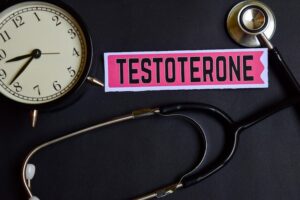Rediscover Your Strength and Confidence with Testosterone Replacement in Downers Grove, IL
As men age, they may mistakenly believe that symptoms like fatigue, reduced libido, and irritability are just part of getting older. However, these can be signs of low testosterone (Low T). Testosterone Replacement Therapy (TRT) can help restore energy, mental clarity, and overall well-being. If you’re experiencing these issues, consider testosterone replacement in Downers Grove, IL, as a way to improve your quality of life.

Recognizing the Symptoms of Low Testosterone
Low testosterone, often referred to as Low T, can significantly impact a man’s health, leading to both physical and emotional changes. The effects go beyond just a decrease in libido; Low T can cause a variety of symptoms that affect both the body and mind.
Physical Changes
-
Chronic fatigue: Persistent tiredness, even after sufficient sleep, may be linked to low testosterone levels.
-
Loss of muscle mass: Reduced muscle strength and mass and increased body fat are common indicators of Low T.
-
Gynecomastia: This condition involves the development of enlarged breast tissue in men, often related to hormonal imbalances.
Emotional and Mental Effects
-
Mood swings and irritability: Low testosterone levels can lead to mood swings and increased irritability, which may affect relationships and daily interactions.
-
Depression and anxiety: A decrease in testosterone levels has been connected to feelings of sadness or anxiety, making it challenging to maintain a positive outlook.
-
Brain fog: Difficulty concentrating or a lack of motivation can indicate Low T, which can adversely affect both professional and personal life.
Sexual Health
-
Reduced libido: A noticeable decrease in sex drive is one of the most common symptoms of low testosterone.
-
Erectile dysfunction: Difficulty achieving or maintaining an erection can also result from Low T.
-
Decreased semen volume: Testosterone plays a crucial role in semen production, and a deficiency can lead to reduced volume.
If you are experiencing a combination of these symptoms, it’s essential to consult a healthcare professional for proper testing and diagnosis.
The Diagnostic Process: Understanding Your Hormonal Health
The first step in addressing low testosterone is receiving an accurate diagnosis. Rather than relying on self-assessment or online symptom checkers, it’s essential to undergo a professional evaluation.
A typical assessment for testosterone replacement therapy includes:
-
Comprehensive consultation: A detailed discussion of your symptoms, lifestyle, and medical history.
-
Blood tests: Lab work is crucial to measure testosterone levels and other related hormones, such as free testosterone, to get a clear picture of your health.
-
Personalized analysis: Based on lab results and symptoms, treatment options are tailored to suit your specific needs.
Exploring Testosterone Replacement Therapy (TRT)
TRT, or testosterone replacement therapy, is an effective treatment aimed at restoring testosterone levels to normal. There are several methods available for administering testosterone, each offering distinct benefits.
Testosterone Injections
-
Administered once or twice a week, injections provide a direct and efficient way to boost testosterone.
-
Regular monitoring and dosage adjustments are needed for consistent results.
Topical Gels or Creams
-
These daily applications are absorbed through the skin and are a convenient, non-invasive option.
-
Precautions are necessary to prevent transferring the gel to others.
Subcutaneous Pellets
-
For long-term treatment, pellets are inserted under the skin and release testosterone gradually over several months.
-
This method minimizes the daily hassle of treatment and provides a steady release of hormones.
Other options include patches and buccal treatments, offering personalized alternatives for testosterone replacement.
Addressing Common Concerns About TRT
Many men considering testosterone replacement therapy have questions about safety, potential side effects, and what to expect. It’s important to have these conversations with a trusted healthcare provider who specializes in TRT.
-
Safety: Regular blood tests help manage side effects, like increased red blood cell count (erythrocytosis).
-
Fertility: TRT can affect sperm production, so men planning to have children should discuss fertility options with their doctor.
-
Results Timeline: Improvements in mood, energy, and muscle mass may be noticed within weeks, but full benefits can take several months.
Key Factors to Consider When Selecting a TRT Provider in Downers Grove
Selecting the right clinic for testosterone replacement therapy in Downers Grove, IL, is crucial for achieving lasting results. When choosing a provider, consider the following factors:
-
Expertise: Choose a clinic with physicians specializing in hormone optimization and TRT.
-
Personalized care: Treatment should be tailored to meet your individual needs, considering both your symptoms and lab results.
-
Comprehensive support: A clinic that provides ongoing monitoring, lifestyle recommendations, and holistic care can offer a more well-rounded approach to your health.
Take the First Step Toward Reclaiming Your Health
If you’re tired of coping with the frustrating symptoms of Low Testosterone (Low T), testosterone replacement therapy in Downers Grove, IL, might be the solution you’ve been seeking. At The Revival Clinic, we specialize in helping men regain their vitality and enhance their quality of life through personalized TRT plans. With the right diagnosis, treatment, and ongoing support, you can feel like yourself again. Contact us today to schedule a consultation and take the first step toward a healthier, more vibrant you.
FAQs
How is low testosterone (Low T) diagnosed?
Low testosterone is diagnosed through morning blood tests (at least two readings) that measure total and free testosterone, SHBG, LH, and related hormones, in combination with a symptom assessment.
What are the risks and side effects of TRT?
Common side effects of testosterone replacement therapy (TRT) include increased red blood cell production, acne, mood changes, fluid retention, and changes to the prostate. Clinics conduct periodic blood work to monitor these risks.
Does TRT affect fertility and sperm production?
Yes, TRT can suppress natural testosterone production and reduce sperm count. Men who wish to have children should discuss options for fertility preservation or consider adjunct therapies such as hCG.
Is TRT safe for my heart and prostate?
When monitored appropriately, TRT has not been shown to increase the risk of heart attack or stroke in men with hypogonadism. Prostate parameters, including PSA levels, are regularly checked to monitor any changes.
How long do I need to continue TRT?
TRT is typically considered a long-term therapy, as stopping treatment often leads to a return of symptoms. Ongoing monitoring and adjustments are necessary to maintain hormonal balance.
